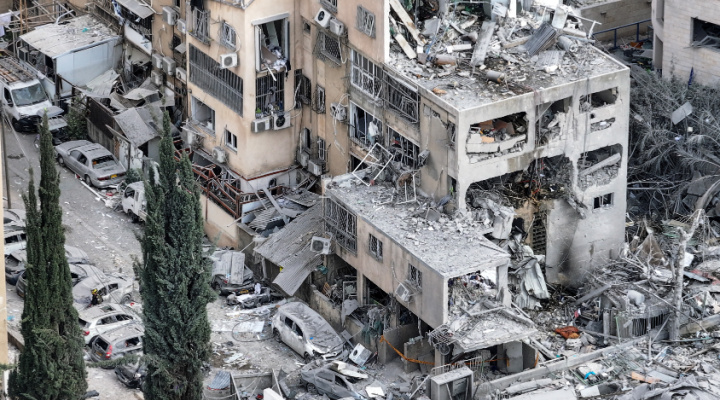A drone photo shows the damage over residential homes and a school at the impact site following a missile attack from Iran on Israel, in Bnei Brak, Israel, June 16, 2025. Photo: REUTERS/Chen Kalifa
As the recent phase of the war broke out between Israel and Iran, former MK Rachel Azaria found herself unable to return to Israel, because the country’s airspace was closed. She eventually ended up leaving for Cyprus with the hope to catch a flight or a boat back to Israel. Over Shabbat, I had the opportunity to host Rachel Azaria in my home.
Azaria now serves as CEO of HaOgen, an NGO that supports Israel’s reservists and their families — providing psychological aid and physical assistance. These crucial services are an important part of the war effort.
As we sat at the table and began discussing the unfolding events in Israel and the broader region, I found myself listing off the many positives: the military’s initial operational successes, setting back Iran’s nuclear ambitions, and the geopolitical recalibration that could favor the Jewish State for the first time in decades.
But as I spoke, I noticed a different expression on Rachel’s face — a weight in her eyes that told a more complicated story. I asked her what was wrong. Her response stopped me in my tracks.
“You don’t understand the pain,” she said. “Yes, we’re winning the war. But the cost is very, very high.”
That sentence lingered with me all Shabbat, and hasn’t left me since. Because it’s true. This moment isn’t just a military or diplomatic turning point. It’s also a human one. And it’s being lived in parallel, through two very different experiences.
There’s the macro story — the geopolitical screen. But there’s also the micro story — the human screen. And on this side, the toll is staggering.
Adults and children in Israel are living with the daily trauma of sirens, rocket attacks, and funerals. Marriages are under strain as reservists who come home are struggling to adapt and then readapt to civilian life. Families are economically battered, emotionally drained, and often psychologically scarred. The psychological trauma is real, not just among soldiers, but among civilians, mothers, and children.
This is a crisis that will take at least a generation to unwind. This quieter crisis is too often underreported or overlooked, especially by those of us watching from afar. As individuals and communities think about how to support Israel, this is a piece of the equation that needs attention as well
This is the split-screen reality of the war.
For those of us living in the Diaspora, especially here in America, it’s easy to focus on the big picture. Faced with rising antisemitism, media bias, and political hostility on our own streets, we look to Israel and find comfort in her strength. In many ways, we need her victories in order to feel strong ourselves — but we’re not the ones paying the direct cost.
Rachel’s voice, however, reminded me that someone is.
This is concurrently a tale of triumph and a tale of sacrifice. A tale of two screens — and we must direct help and resources to the micro human screen as well as the geopolitical one. We need to hold both realities in our minds — the great pride and hope for what Israel can accomplish, and the sober recognition of what it is costing.
Daniel Rosen is the Co-founder of a new initiative called Emissary4all which is an app to organize people on social media by ideology not geography. He is the Co-host of the podcast called “Recalibration.” You can reach him at [email protected]
The post As Americans, We Cannot Forget the Human Cost of What’s Happening in Israel first appeared on Algemeiner.com.
Click this link for the original source of this article.
Author: Daniel Rosen
This content is courtesy of, and owned and copyrighted by, https://www.algemeiner.com and its author. This content is made available by use of the public RSS feed offered by the host site and is used for educational purposes only. If you are the author or represent the host site and would like this content removed now and in the future, please contact USSANews.com using the email address in the Contact page found in the website menu.








